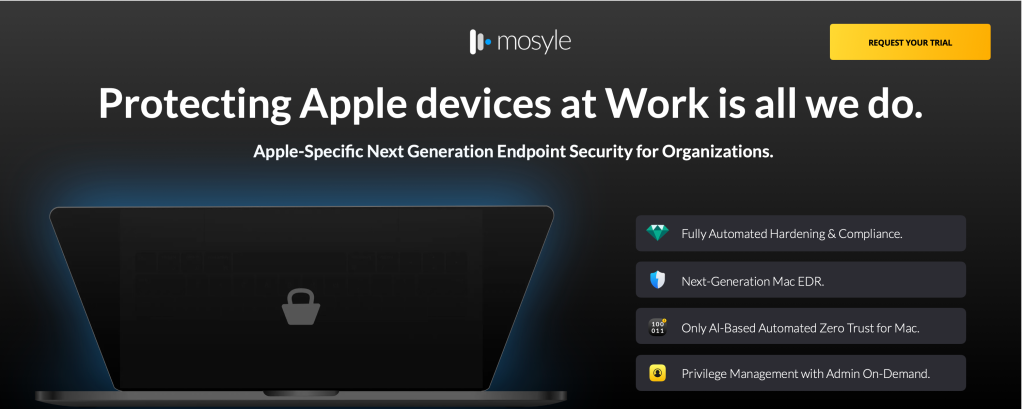Safety researchers have detected a brand new pressure of malware hidden in some generally pirated macOS functions. As soon as put in, the apps unknowingly execute trojan-like malware within the background of a consumer’s Mac. What occurs from right here is nothing good…
9to5Mac Safety Chunk is solely dropped at you by Mosyle, the one Apple Unified Platform. Making Apple units work-ready and enterprise-safe is all we do. Our distinctive built-in strategy to administration and safety combines state-of-the-art Apple-specific safety options for absolutely automated Hardening & Compliance, Subsequent Era EDR, AI-powered Zero Belief, and unique Privilege Administration with essentially the most highly effective and fashionable Apple MDM in the marketplace. The result’s a completely automated Apple Unified Platform presently trusted by over 45,000 organizations to make tens of millions of Apple units work-ready with no effort and at an reasonably priced price. Request your EXTENDED TRIAL in the present day and perceive why Mosyle is the whole lot that you must work with Apple.
That is Safety Chunk, your weekly security-focused column on 9to5Mac. Each Sunday, Arin Waichulis delivers insights on information privateness, uncovers vulnerabilities, and sheds gentle on rising threats inside Apple’s huge ecosystem of over 2 billion energetic gadgets. Keep knowledgeable, keep safe.

Whereas investigating a number of menace alerts, Jamf Risk Lab researchers got here throughout an executable file with the title .fseventsd. The executable makes use of the title of an precise course of (not by chance) constructed into the macOS working system used to trace modifications to information and directories and retailer occasion information for options like Time Machine backups. Nonetheless, .fseventsd isn’t an executable. It’s a local log. On prime of this, Jamf discovered that Apple didn’t signal the suspicious file.
“Such traits usually warrant additional investigation,” Jamf Risk Labs acknowledged in a weblog submit concerning the analysis led by Ferdous Saljooki and Jaron Bradley. “Utilizing VirusTotal we had been capable of decide that this curious-looking .fseventsd binary was initially uploaded as a part of a larger DMG file.”
The duo found 5 disk picture (DMG) information containing modified code of generally pirated functions, together with FinalShell, Microsoft Distant Desktop Shopper, Navicat Premium, SecureCRT, and UltraEdit.
“These functions are being hosted on Chinese language pirating web sites with the intention to achieve victims,” Jamf explains. “As soon as detonated, the malware will obtain and execute a number of payloads within the background with the intention to secretly compromise the sufferer’s machine.”
Whereas on the floor, the apps could look and behave as supposed, a dropper is executed within the background to ascertain communications with an attacker-controlled infrastructure.
At a better degree, the .fseventsd binary executes three malicious actions (on this order). First, the malicious dylib (dynamic library) file is loaded, which acts as a dropper executing every time the appliance is opened. That is adopted by a backdoor binary obtain that makes use of the Khepri open-source command-and-control (C2) and post-exploitation device and a downloader that units up persistence and downloads extra payloads.
The Khepri open-source mission can enable attackers to gather details about a sufferer’s system, obtain and add information, and even open a distant shell, Jamf explains. “It’s potential that this malware is a successor to the ZuRu malware given its focused functions, modified load instructions, and attacker infrastructure.”
Apparently, for the reason that Khepri backdoor stays hidden in a short lived file, it deletes each time the sufferer’s Mac reboots or shuts down. Nonetheless, the malicious dylib will load once more the following time the consumer opens the appliance.
shield your self
Whereas Jamf believes this assault primarily targets victims in China (on [.]cn web sites), it’s necessary to recollect the inherent risks of pirated software program. Sadly, a lot of these putting in pirated apps predict to see safety alerts as a result of the software program isn’t professional. This leads them to quickly smash the “Set up” button, skipping over any safety warning prompts from macOS Gatekeeper.
As well as, set up respected antivirus and anti-malware software program. Whereas this explicit malware can slip by means of undetected, having an additional layer of protection on Mac is at all times good apply.
Extra on safety and privateness
Comply with Arin: Twitter (X), LinkedIn, Threads

